During an interview with Dr Modupe Elebute-Odunsi (MBBS MD FRCP FRCPath), Consultant Haematologist and Co-Founder/CEO of Marcelle Ruth Cancer Centre & Specialist Hospital in Victoria Island, Lagos; she highlighted her journey through cancer research and care provision. Further, sharing her vision on advancing cancer care and training in Nigeria – against all odds.
Interview by the MWAN Lagos 2nd Edition Amazons In Medicine (AIM) Magazine Interview Team (Ibironke Sodeinde (DR), Dr Iruoma Osonwa, Ifeoluwa Oyewole, Dr Funke Cole and Dr Enoch Oyegbade). Edited by Mary Oluwakemisola Agoyi (Editor, MWAN Lagos AIM Magazine and Medical Mirror)

Introduction
Cancer is a global health crisis that affects millions of lives each year. In Nigeria, the burden of cancer is particularly high, with limited access to quality care and treatment options. However, with the right strategies and investments, Nigeria has the potential to become a foremost hub for cancer care.
Firstly, raising awareness about cancer prevention and early detection is crucial. Public education campaigns can be implemented to inform Nigerians about the risk factors associated with cancer and promote healthy lifestyle choices. Additionally, regular screenings should be made widely available to detect cancers at an early stage when they are more treatable.
In dialogue with Dr. Modupe Elebute-Odunsi, MBBS MD FRCP FRCPath we look at the journey of a highly respected Consultant Haemato-oncologist and the visionary CEO/Founder of the Marcelle Ruth Cancer Centre & Specialist Hospital, spearheading its mission to establish Nigeria as a leading destination for comprehensive cancer care.
Through her relentless commitment to excellence, she has pioneered the creation of a state-of-the-art facility that offers easily accessible, world-class treatment to patients across the country. Dr. Elebute’s illustrious career began with her medical degree from the prestigious Lagos University Teaching Hospital in 1986, marking the commencement of her journey towards transformative cancer care in Nigeria. Eager to expand her knowledge and skills, she pursued further training in Internal Medicine and Haematolo-Oncology at renowned institutions in London, where she honed her expertise under the tutelage of eminent professionals. During her time in the United Kingdom, Dr. Elebute was honored with a distinguished Leukemia Research Fellowship, allowing her to undertake groundbreaking research that would shape her future endeavors. Her tireless efforts culminated in the attainment of a Doctor of Medicine (MD) degree from the University of London, underscoring her dedication to advancing the field of Haematology.
Prior to her return to Nigeria, Dr. Elebute held various Consultant and Honorary Senior Lecturer positions at esteemed institutions in the UK, including St George’s Hospital & Medical School, the UK National Blood Transfusion Service and King’s College Hospital. She not only provided exceptional patient care but also contributed significantly to the academic community, playing a pivotal role in developing the undergraduate Hematology curriculum at St George’s University of London. Recognized as a trusted leader in her field, Dr. Elebute assumed the role of Postgraduate Director and Educational Supervisor for the University of London’s distinguished Hematology Postgraduate Training Program. Year after year, she mentored and guided aspiring hematologists, leaving an indelible impact on the next generation of healthcare professionals. With her wealth of knowledge and extensive experience, Dr. Elebute remains steadfast in her commitment to revolutionizing cancer care in Nigeria. She tirelessly strives to provide her patients with the highest standard of treatment, ensuring that they receive nothing less than exceptional care and compassion throughout their journey.
Dr. Elebute’s unwavering leadership and dedication to improving the lives of individuals affected by cancer have earned her a distinguished reputation in the field of Haemato-oncology. Her visionary approach, combined with her compassionate nature, propels Nigeria forward as a foremost hub for cutting-edge cancer care, elevating the nation’s healthcare landscape and inspiring hope for all those impacted by this devastating disease.
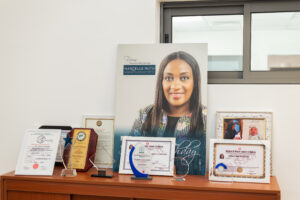
Journey into Haematology: The Spark of Interest and Embracing the Intersection of Science and Compassion
The field of haematology has been central to Dr Elebute’s career: the fascinating blend of scientific inquiry and patient care captivated her since her early days in medical school. We look at her journey through her experiences, education and training and the culmination of a career from the UK public sector, academia and now changing the narrative of medical practice in Lagos, Nigeria.
During her fourth year of medical school, she had the opportunity to undertake a post in the hematology department. Under the guidance of Professors Akinyanju and Akinsete, she immersed herself in the world of hematology. It was during this time that she peered through a microscope to diagnose sickle cell disease. The ability to make a diagnosis through microscopic examination fascinated her, igniting a spark of interest that would shape the course of her professional life. She realized that hematology offered a unique intersection between laboratory findings and patient care, making it an ideal specialty for someone like her, who appreciated the seamless transition between these two worlds.
In the early 1980s, sickle cell disease carried significant stigma, particularly due to the high mortality rates, especially among children. Diagnosis brought feelings of hopelessness, as it significantly affected life expectancy. Recognizing the need for awareness and compassionate care, Professor Akinyanju embarked on establishing a sickle cell club. Intrigued by the vision of this club, Dr Elebute became actively involved from the beginning; she set up a small clinic in a local market where she visited once a month, providing care for children with sickle cell-related issues, such as dactylitis. These experiences reinforced her commitment to haematology, as she witnessed the positive impact that specialized care and support could have on patients and their families.
Throughout her medical training, she had definite preferences when it came to choosing a specialty. While obstetrics, surgery, and psychiatry did not resonate with her, the field of haemato-oncology immediately captured her attention. For one, it aligned perfectly with her lifestyle aspirations, including starting a family. Unlike other specialties that frequently required being on-call at the hospital throughout the night, hematology provided a balance that allowed her to fulfill both personal and professional goals. What truly intrigued her about hematology was the seamless transition between laboratory investigation and direct patient care. One moment, she interacted with patients, listening to their concerns, offering support, and the next moment, she is examining a slide under the microscope, deciphering the intricate details that would illuminate the nature of their condition. This dual role gave her a profound sense of fulfillment, knowing that she could contribute to both the scientific understanding of diseases and the well-being of her patients.
While her early research career primarily focused on “non-malignant” blood disorders, her clinical practice gradually evolved more towards the field of haemato-oncology. As time went on, she found herself immersed in the diagnosis, treatment, and management of blood cancers. With every patient interaction, she witnessed the immense impact that these conditions had on their lives and the lives of their loved ones. This realization further deepened her passion for hematology and oncology, driving her to stay abreast of the latest research, therapies, and advancements in the field.

Seizing Unexpected Opportunities: The Research Journey
Throughout her career, she pointed out that the most seemingly uninteresting or mundane topics can hold immense potential and lead to extraordinary opportunities. This lesson became evident when she received a research grant in the United Kingdom, even though it wasn’t specifically for leukaemia. The UK is known for organizations that provide funding for research, scholarships, and programs for young doctors interested in pursuing full-time research for a period of about two years.
These research opportunities are often financed by renowned foundations like The Leukemia Research Foundation (LRF), pharmaceutical companies and others. Although these grants typically focus on malignant conditions such as leukemia, she chose to embark on a different path. Her research delved into non-malignant conditions, specifically bone marrow failure syndromes like Aplastic Anemia, Myelodysplasia, and a rare condition called Paroxysmal Nocturnal Hemoglobinuria (PNH). PNH was a condition rarely encountered in practice but widely discussed in textbooks.
Her work on PNH and other bone marrow syndromes marked a turning point in her career. As a trainee at St George’s, she transitioned into becoming a consultant while pursuing her MD program, which was generously funded by the Leukemia Research Fund. This funding opportunity allowed her and her team to complete the research they had been diligently working on and resulted in publications that contributed to the medical community’s understanding of these conditions.
During this period, a pharmaceutical company approached the team with a drug they had developed, initially designed for managing Renal vasculitis. However, they found limited success in that area and recognized the potential of their drug in treating PNH, a condition characterized by the massive breakdown of red blood cells in response to infections or pregnancy. Intrigued by the possibilities, they conducted clinical trials using their drug molecule on PNH patients, and it proved to be highly successful. Patients who were previously dependent on red blood cell transfusions became transfusion independent after being treated with the drug. This groundbreaking drug, known as Soliris eventually received licensing and became one of the most expensive drugs available today. Her focus shifted to managing PNH and its treatment through this costly drug. In the UK, PNH is classified as an ultra-orphan condition, affecting fewer than a thousand people around the globe. Consequently, the government provides separate funding to support the care of these patients, considering the high cost of treatment. Due to her expertise in managing PNH and related issues, she was entrusted with setting up centers within the country to provide care for PNH patients. This involved assessing eligibility for the drug and seeking funding opportunities. Her reputation spread, and she began receiving referrals from across Europe as patients sought access to this life-changing treatment and potential funding possibilities.
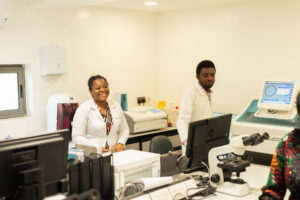
This experience taught her a valuable lesson – seizing any opportunity, regardless of perceived interest, can open unforeseen doors. She encourages junior doctors to pursue research on seemingly mundane topics, even if it may sound odd to them. She personally attests that the most unexpected subjects can harbor immense potential. It is crucial to approach every opportunity with curiosity and an open mind, for you never know where it may lead.
With the LRF funded training, she dedicated two full years to conducting research and writing her thesis. This work eventually earned her the degree of Doctor of Medicine from the University of London. After completing her MD, she returned to clinical medicine armed with a deeper understanding of her field. Looking back, she is grateful for the twists and turns in her research journey. Embracing seemingly mundane topics unlocked extraordinary possibilities for her, emphasizing the importance of exploring every opportunity that comes our way. She firmly believes that dismissing anything as uninteresting would be a disservice to our potential growth and development.
So, she encourages aspiring researchers and healthcare professionals alike to embrace all research avenues, no matter how unexciting they may appear. The power of unexpected opportunities lies in our ability to recognize their potential and seize them wholeheartedly. By doing so, we can uncover groundbreaking discoveries, pave new paths and leave an indelible mark on our chosen fields.
To my 20-year-old self, I’d say: “There will always be ups and downs in life, what really matters is what you do with them. Also, using all the failures, experiences, and opportunities that one has is very important for growth in all ramifications”. ~ Dr. Elebute
The Dream of Marcelle-Ruth: Honoring a Legacy
The healthcare sector in Nigeria has been making significant strides, particularly in the field of cancer care. One individual who has contributed immensely towards this progress is Dr. Elebute, her experience balancing her personal and professional life, highlighting the challenges encountered along the way.
She emphasized that achieving perfect equilibrium is illusory, as life inherently involves peaks and valleys. As a Junior Doctor in the UK, she experienced emotional turmoil when realizing that she was being exploited and witnessing others securing positions that she deserved. However, she adopted a realistic approach and understood that difficult times serve to enhance one’s character. She noted that it is essential to utilize all failures, experiences, and opportunities at one’s disposal. Maintaining a balance between her professional and personal life was another challenge. She mentioned that there will inevitably arise occasions that prove challenging, whether it is arriving home late or raising one’s voice towards one’s children due to their negligent approach towards completing their homework. Therefore, it is imperative to maintain composure, for such is the nature of existence, wherein one may not always achieve absolute success in every endeavor.
Highlighting the importance of possessing necessary skills to attend to patients adequately, she recalled instances where being on-call with a waiting list of thirty patients made it necessary to perform all procedures individually and sequentially, without relying on any cardiothoracic specialist. Furthermore, she emphasized the necessity of possessing self-confidence, particularly in collaborating with individuals who lack confidence or willingness to undertake these tasks.
Emphasizing the importance of embracing failures and utilizing all opportunities that come one’s way, including writing papers and scholarly articles. As a mother of five children, she found solace in the late hours after their bedtime to engage in scholarly writing. Her innate competitiveness drove her to strive to be the foremost individual to complete assignments, which has yielded fruit, as evidenced by her successful career trajectory.
Her experience exemplifies the challenges individuals encounter while balancing their personal and professional lives. Her formidable resilience and determination in navigating through various responsibilities and challenges make her an inspiration to many. Her contribution towards cancer care in Nigeria demonstrates the potential for developing world-class healthcare services, even in resource-limited settings.
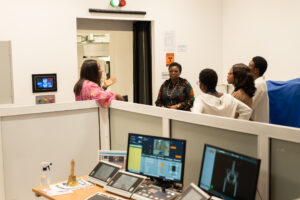
As the daughter of Eminent Professors of Surgery and Medicine and pioneers in Nigerian medical affairs (education – LUTH; private healthcare – Lagoon Hospital; HMO – Hygeia), Dr Elebute was inspired to make her own mark in the Nigerian healthcare space. This manifested in the opening of the Marcelle Ruth Cancer Centre & Specialist Hospital an ultra-modern specialist hospital conceived and executed with the specific intention of addressing the detection and treatment of cancer and several other specialist conditions in an environment akin to a top private hospital in Europe or North America. The hospital, which is wholly owned by herself and her husband, Bolaji Odunsi, a financier commenced operations in 2020. It is named after her late mother-in-law, Marcelle Ruth Anne Odunsi, who tragically passed away from complications of breast cancer in 1998. She was not only a strong and courageous woman but also possessed a remarkable sense of humor that could light up any room. The hospital is a tribute to her and her battle with cancer and aims to bring hope and healing to those afflicted with this devastating disease.
The manifestation of Marcelle-Ruth is more than just a physical space; it is a testament to the strength and resilience of those impacted by cancer. Through this facility, she and her team aim to provide comprehensive care, support, and hope to all who walk through its doors. It is a place where cutting-edge treatments merge with compassionate care, where laughter and healing coexist, and where the legacy of Marcelle-Ruth and my father can live on.
Increasing funding for cancer research is vital in developing innovative therapies and improving patient outcomes. Collaboration between researchers, pharmaceutical companies, and government agencies can accelerate progress in understanding the molecular basis of different cancers prevalent in a country and can be the catalyst for unexpected opportunities.
Training and Passing on Knowledge to Oncology Doctors in Nigeria: Boosting the Number of Trained Oncologists for a Cancer Care Hub
The field of oncology in Nigeria has seen notable progress, but there is a pressing need to further increase the number of trained oncologists. By investing in training programs and passing on knowledge to doctors with an interest in oncology, Nigeria can establish itself as a hub for cancer care. Dr Elebute highlights the benefits of training and teaching medical trainees in oncology.
She emphasized the significance of teaching and imparting knowledge to medical trainees, particularly senior house officers and residents. As a clinician, she believes that it is vital to share expertise with those in more junior positions. By engaging in teaching opportunities, this can enhance their own understanding of the subject matter and benefit from thought-provoking questions posed by trainees. This two-way feedback loop fosters continuous learning and improvement.
Dr. Elebute actively seeks teaching opportunities, both within her institution and by welcoming individuals interested in observing medical practice. Through these initiatives, she has been able to teach and mentor approximately ten trainees in the past year and a half. Moreover, her involvement in lecturing and teaching within the Hematology subunit has allowed her to develop a teaching style that resonates well with students. Her engaging approach, which includes humor and interactive elements, promotes active participation, and enhances the learning experience.
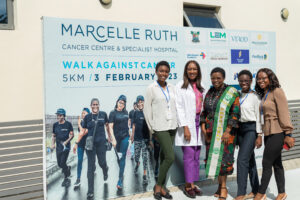
Marcelle-Ruth Cancer Centre prioritizes teaching and learning through various activities. Daily ward rounds and weekly educational meetings ensure ongoing education for the entire team. Monthly quality assurance and mortality and morbidity reviews provide opportunities for reflection and improvement. In addition, regular lectures and journal club sessions are organized, allowing team members to contribute and share knowledge. She emphasizes the importance of collaboration and acknowledges the exceptional outcomes that arise from dedicated teamwork.
Her commitment to teaching stems from her own experiences in previous institutions, including LUTH. Even there, they held regular journal club sessions and participated in academic meetings, fostering a culture of learning and teaching. This culture has been implanted in Marcelle-Ruth, where she continues to derive immense satisfaction from teaching and witnessing the transformative impact on individuals who actively engage in the learning process.
Training and passing on knowledge to doctors with an interest in oncology is crucial for Nigeria to become a hub for cancer care. Her experience highlights the importance of teaching medical trainees, creating opportunities for learning within medical institutions and nurturing a culture of continuous education. By investing in training programs and encouraging experienced clinicians to pass on their knowledge, Nigeria can bolster the number of trained oncologists and significantly improve cancer care services in the country.
Making Nigeria the West African Hub for Cancer Care: A Journey of Personal Aspiration and Strategic Considerations
The establishment of specialized medical centers in Nigeria plays a crucial role in positioning the country as a hub for cancer care. Dr. Elebute’s insight on her personal journey and strategic considerations for bringing her expertise in internal medicine and oncology to Nigeria. Through extensive research and innovative approaches, she has successfully contributed to the development of specialized centers that focus on specific medical specialties.
She embarked on her endeavor to set up operations in Nigeria around 2012. Serendipitously, her husband expressed a desire to return to their home country, presenting an unexpected opportunity for both. While they were experiencing success in their respective careers, she made the decision to dedicate herself to her children’s upbringing. However, her husband’s support and encouragement paved the way for her to pursue her aspirations in Nigeria. Together, they spent two years extensively researching the business prospects and ensuring the feasibility of their venture.
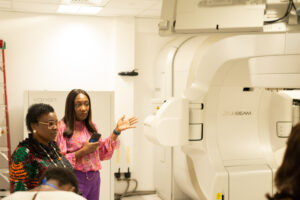
As a clinician with limited exposure to the business realm, she relied on her husband’s expertise to evaluate the viability of their plans. They conducted thorough research by visiting comparable circumstances in India and South Africa to gain insights into the challenges and potential opportunities in Nigeria. Their objective was to establish an enterprise that aligned with their initial goals, including maintaining their standard of living and ensuring their children’s education. This diligent approach allowed them to make informed decisions and lay the foundation for successful operations.
Her decision to focus on internal medicine and oncology in Nigeria was driven by her passion and recognition of a global trend towards specialized medical centers. Establishing and running such centers requires significant effort, focused attention, and resources. Unlike setting up a general hospital with multiple departments, specialized centers can ensure a more targeted patient base and optimize staffing requirements for profitability. The model of specialist centers, seen in locations like the London Rheumatology Center or London Dermatology Center, allows for concentrated expertise and better patient outcomes.
The challenges of infrastructure expenses and staffing are not unique to Nigeria but are prevalent in the private healthcare sectors of developed countries as well. She acknowledges the complexities of running a hospital with multiple departments and the difficulties in staffing a diverse team. Thus, the strategic approach of establishing specialty centers addresses these challenges by leveraging focused expertise and efficient resource allocation. By adopting such an approach, Nigeria can optimize its healthcare resources and improve patient access to specialized care.
Advancing Cancer Care in Nigeria: A Vision for Marcelle-Ruth’s Expansion
Finally, we explore Dr. Elebute’s vision for the Nigerian health space, focusing on her goal of expanding Marcelle-Ruth’s clinical services and establishing a stem cell unit. With a deep-rooted aspiration to provide comprehensive care under one roof and contribute to medical education, she aims to make Nigeria a hub for cancer care by enhancing treatment options and fostering collaboration within the healthcare ecosystem.
She envisions a future for Marcelle-Ruth that includes a dedicated stem cell unit catering not only to sickle cell patients but also those with multiple myeloma and lymphomas. As she highlights, the need for this specialized unit is apparent when patients with acute leukemia require transplants, a service currently sought abroad, primarily in India, due to cost concerns in the UK. By establishing their own stem cell unit and providing transplant services, Marcelle-Ruth can ensure seamless, comprehensive care for patients, eliminating the need for external referrals and reducing the burden on individuals seeking treatment.
The overarching goal of having all necessary services available under one roof at Marcelle-Ruth reflects a patient-centric approach. She recognizes the importance of convenience, continuity, and emotional support throughout the cancer care journey. By offering comprehensive services, including stem cell transplantation, patients can receive holistic care within their own country, fostering better patient outcomes and empowering individuals to face their medical challenges with increased resilience.
In addition to expanding clinical services, Dr. Elebute emphasizes the importance of teaching and collaboration both within and outside Marcelle-Ruth. Through partnerships with medical schools, she envisions the establishment of a haemato-oncology training program, enabling the transfer of knowledge, skills and expertise to the next generation of medical professionals. By nurturing a culture of continuous learning and innovation, she aims to uplift the field of cancer care in Nigeria, equipping healthcare providers with the necessary tools to deliver high-quality, evidence-based treatments.
Achieving her goals within the Nigerian health space signifies making a meaningful contribution and leaving a lasting impact. By expanding Marcelle-Ruth’s services, establishing a stem cell unit, and advancing medical education, she believes she can truly make a difference in the lives of countless patients, providing them with world-class care within their own country. This vision aligns with Nigeria’s aspirations of becoming a hub for medical tourism, attracting patients from across the region.
Conclusion
Dr. Elebute’s unwavering determination to expand Marcelle-Ruth’s clinical services and establish a stem cell unit exemplifies her commitment to making Nigeria a hub for cancer care. Her patient-centric approach and focus on comprehensive, under-one-roof services demonstrate a deep understanding of the needs and challenges faced by cancer patients in the country. By prioritizing collaboration and medical education, she seeks to empower the next generation of healthcare providers and elevate the standards of cancer care in Nigeria. With her visionary approach and passion, her goals are to transform the landscape of cancer care, and her accomplishments will serve as a beacon of inspiration for aspiring healthcare professionals and entrepreneurs alike.
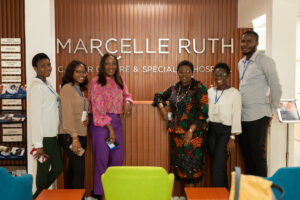


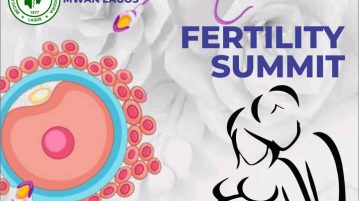
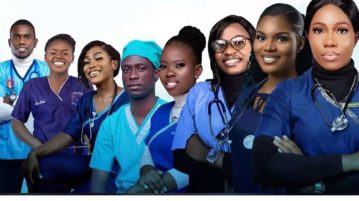

Discussion2 Comments
Amazing blog full of useful information!
Pingback: MANSAG: Promoting Research and Healthcare Innovations among the Black Ethnic and Nigerian Medical Community in the United Kingdom